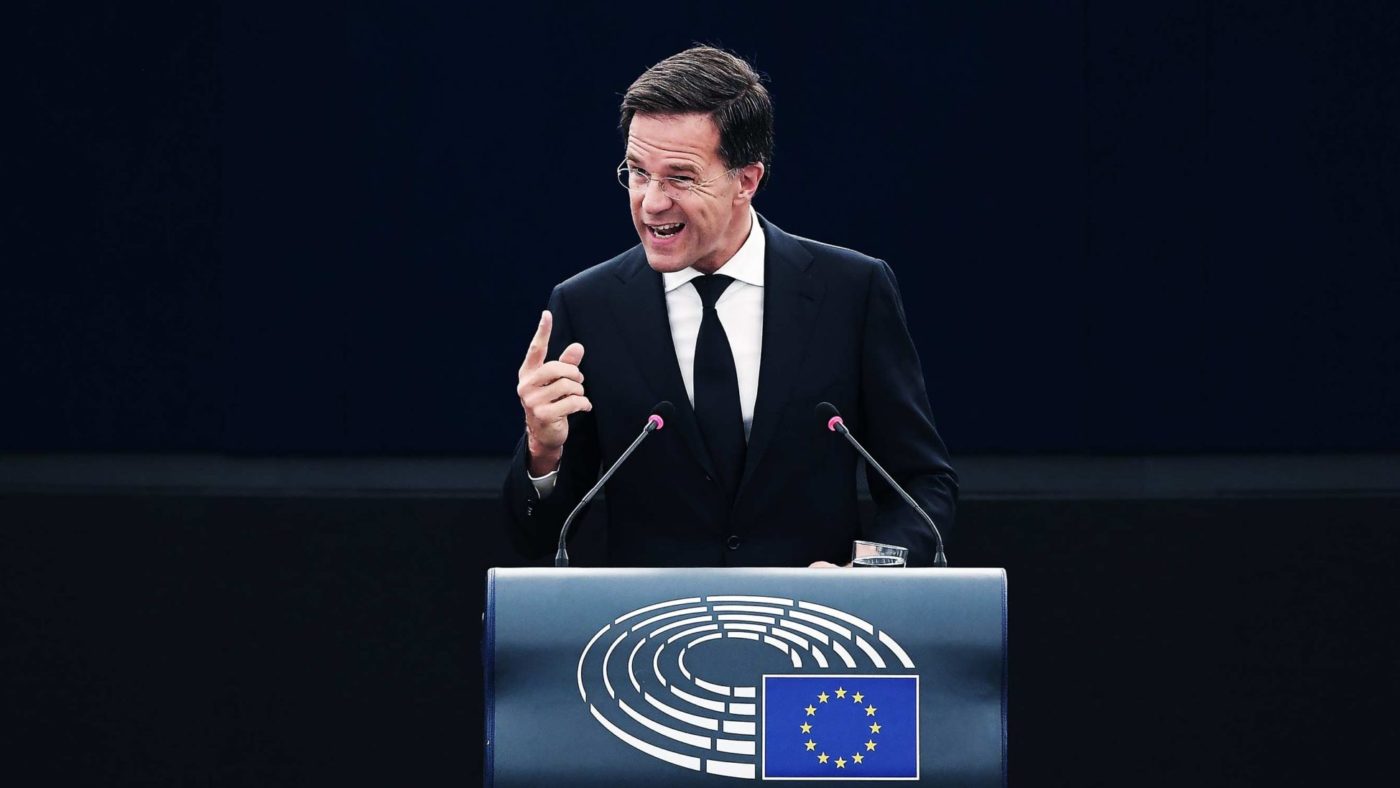When Britain voted to Leave the EU, the immediate response from European leaders and the Brussels establishment was shock followed by pessimism. But the mood turned surprisingly quickly. Ever since Emmanuel Macron’s triumph in the French presidential elections, grand plans have been back on the menu, with more EU integration being heralded as the only answer to Europe’s problems.
But a dissenting voice was given a hearing yesterday. In his Strasbourg speech on the future of Europe, Mark Rutte struck a markedly different tone and delivered an entirely different message to Macron and others.
The Prime Minister of the Netherlands has recently come to the fore as one of Europe’s more sceptical voices. Speaking in front of the European Parliament, he once again made it clear that for him, more and more EU is simply not the answer to today’s problems.
“For some, ‘ever closer union’ is still a goal in itself. Not for me,” Rutte said, quoting Goethe: “In der Beschränkung zeigt sich der Meister” (“Mastery is revealed in constraint”).
Instead of finding ever new competences and tasks, Rutte argued that Brussels should hold onto the “original promise of Europe”, the “promise of sovereign member states working together to help each other achieve greater prosperity, security and stability.”
For Rutte, this means focusing on the core benefit of the EU: free trade. The Single Market should be completed and the last barriers eliminated.
Meanwhile, he opposed any plans to increase the next round of the EU budget, for 2021 to 2027: “To the Netherlands, it’s only logical that the budget should shrink after Brexit.”
It’s especially logical if you consider that the Netherlands have been the biggest net payer into the EU budget (relatively speaking) for a long time, and that this share would only increase under the Commission’s current plans. Rutte marked out the Common Agricultural Policy and the cohesion funds as areas where savings need to be made: “At present, agriculture and structural funds swallow up 70 per cent of the budget.”
Rutte’s speech is the latest in a series of interventions that confirm his determination to replace the UK as the leading sceptical voice in the fight against further EU power grabs. Described in a recent Politico profile as “the North’s quiet rebel”, Rutte has, by organizing coalitions with Northern European states, ground many of Macron’s proposals to a halt.
In a recent interview with the Frankfurter Allgemeine Zeitung, Angela Merkel opposed – and thus, more or less put to an end to – most of the eurozone reforms Macron has put forward. But, as Naomi O’Leary put it, “Angela Merkel may have closed the coffin lid on Emmanuel Macron’s EU reform plans, but it was Mark Rutte who dug the grave.”
It would be wrong, however, to pretend there weren’t big differences between Rutte and other, more outspoken Eurosceptics. His opposition to integration plans can partly be explained by his common-sense, realist approach. He remains part of the political, mainstream elite, which is one of the main reasons why he is highly respected in Brussels and seen as one of the top contenders for becoming the next Council President, despite his awkward views on EU integration.
He has called the EU the “most successful example in world history of how multilateralism and the willingness to compromise can bring about unprecedented security, stability and prosperity.”
He is also in favor of some reforms in the Eurozone, such as implementing a European Monetary Fund (EMF), which makes little sense considering he also thinks that the euro was not designed to be “a redistribution of prosperity” or as a way that spendthrift countries can spend money out of the pockets of more fiscally conservative member states (which an EMF would make even easier).
Rutte also used his Strasbourg speech to attack those countries failing to uphold the rule of law. It is certainly true that the rule of law should be complied with by all governments, and it is certainly understandable that the Netherlands or Germany don’t want to send their money to countries they deem as not doing so. But it is not so clear whether the solution would be to give power to decide and penalise countries to Brussels, as Rutte proposes, saying that the Commission should “monitor this rigorously and independently.”
One can imagine the backlash that would follow a decision to withhold funds until a member state adheres to rules put forward by Brussels. Even more worrisome is the track record of Brussels in checking who is adhering to rules. It is hardly neutral, and has tended to overlook breaches closer to home. It’s not clear how this would change if this were to become an even greater competence of the EU.
Nonetheless, the emergence of the Netherlands, as well as Nordic and Baltic states, as vocal critics of Macron’s federalist plans should be the source of much hope for Europe’s future.
With Rutte at the forefront of this coalition, which has been dubbed already as the “Hanseatic League 2.0,” several plans have already been nixed. Considering the confidence and ambitions of the Dutch Prime Minister, he will have plenty more to say about Europe’s future – especially considering the “quiet rebel” is becoming louder and more confident by the day.


